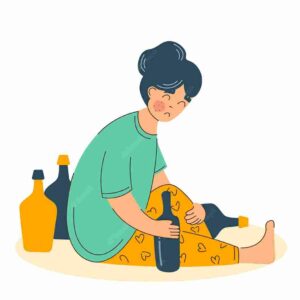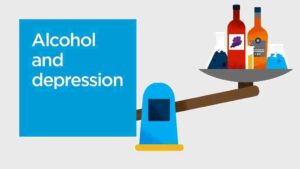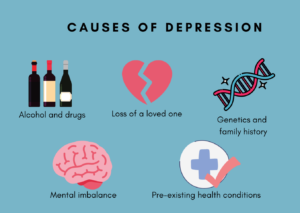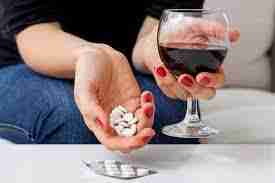Did you know that alcohol can cause depression? It’s true! Alcohol is one of the most common causes of depression. If you are struggling with depression, it is important to be aware of the dangers of drinking alcohol. Alcohol can make your symptoms worse and can even lead to suicide. If you are struggling with depression, please get help from a professional.
Contents
What Is Depression?
 Depression is one of the most common mental disorders, characterized by persistent sadness and a loss of interest in activities that you normally enjoy. It can affect how you feel, think, and handle daily activities such as sleeping, eating, or working. The symptoms can vary from mild to severe and may include changes in your mood, sleep patterns, energy levels, concentration abilities, and/or appetite.
Depression is one of the most common mental disorders, characterized by persistent sadness and a loss of interest in activities that you normally enjoy. It can affect how you feel, think, and handle daily activities such as sleeping, eating, or working. The symptoms can vary from mild to severe and may include changes in your mood, sleep patterns, energy levels, concentration abilities, and/or appetite.
Depression is more than just feeling sad or “blue” for a few days. Depression can happen at any age, but it often begins in the teens or early twenties. It is much more common in women than men and is also more prevalent among people who have certain medical conditions, such as diabetes.
Depression means different things to different people. Some may feel hopeless, helpless, or worthless. Others may even have thoughts of suicide. If you are experiencing any of these symptoms, it’s important to seek help from a mental health professional as soon as possible.
What Is The Link Between Alcoholism And Depression?
Depression and alcohol abuse are often linked. According to the study, about 18 million Americans suffer from an alcohol use disorder, and many of them also suffer from depression.
The link between alcohol and depression is complex. Depression can lead to alcohol abuse, and alcohol abuse can worsen depression symptoms. It’s important to be aware of this connection so you can seek help if you are struggling with both conditions.
Some people drink because they lose their job, and feel like they have no other option. But alcohol only makes the problem worse. It can lead to liver damage, heart problems, and pancreatitis. Alcohol is also a depressant, so it can make your depression symptoms worse.
Depression may even cause people to drink a large amount of alcohol in an attempt to self-medicate. Alcohol may temporarily help to control anxiety and lower inhibitions. However, is that people who drink are more likely to be depressed. Drinking a lot may worsen their feelings, which can then lead to more drinking in an attempt to feel better.
While there are many similarities between alcoholism and depression. Alcoholism is a progressive disease that often leads to addiction and dependence. Depression, on the other hand, is a mental illness that can be triggered by many different factors.
It’s important to be aware of the link between alcohol and depression. If you are struggling with both conditions, seek help from a mental health professional.
What Are The Symptoms of Drinking And Depression?

Symptoms of alcohol and depression can vary depending on the individual. However, there are some common symptoms to look out for:
- Anxiety
- Hopelessness
- Memory problems
- Mood swings
- Sleep problems
- Difficulty in concentrating
- Suicidal thoughts
- Sadness
- Fatigue
- Irritability
Generally, people hide bottles of alcohol, lie about how much they’re drinking, miss work or school due to drinking, and neglect responsibilities at home or work. People who are addicted to alcohol crave it frequently and drink it often. They also build up a tolerance to it, meaning they need to drink more and more over time to get the same feeling.
If you’re experiencing any of these symptoms, it’s important to seek help from a mental health professional.
How Drinking Causes Depression?

The causes of alcohol and depression disorders are numerous and complex. Depression can lead to drinking, and drinking can lead to depression. There is no one cause of either disorder, but there are many risk factors that may contribute to their development.
People who suffer from depression are more likely to turn to alcohol as a way of numbing their emotions and coping with their condition.
Genetic disposition
If you have a family member who suffers from alcoholism or depression, you’re more likely to develop either disorder. Genetic disposition related to alcohol means that your body metabolizes alcohol differently, making you more prone to developing alcoholism.
Social factors
If you have a social circle that revolves around drinking, you may be more likely to develop an alcohol use disorder. People with low self-esteem are more likely to develop depression. Various social factors can contribute to the development of these disorders.
Mental health disorders
Having another mental health disorder, such as anxiety or post-traumatic stress disorder (PTSD), can increase your risk of developing depression or alcoholism.
Environmental factors
Exposure to violence, abuse, or other traumas can cause both depression and drinking as side effects. Stressful life events, such as the death of a loved one or losing your job, can trigger depression. If you’re exposed to alcohol at an early age, you may be more likely to develop an alcohol use disorder later in life.
Heavy drinking can also cause changes in the brain that lead to depression. Chronic drinking can damage the brain regions responsible for mood, cognition, and memory. This damage can lead to long-term changes in brain function and increase the risk of developing depression.
As you can see, many different factors can contribute to the development of depression and alcoholism. Alcoholics are more likely to suffer from depression and anxiety, and drinking heavily can make these mental health disorders worse. If you’re struggling with alcoholism or depression, seek help from a mental health professional. Both disorders are treatable.
How to Deal With Alcoholism and Depression?
 Treatment of depression and alcohol with professional help is important, but it is also necessary to make changes in your lifestyle. Some things you can do to help manage your depression and alcoholism include:
Treatment of depression and alcohol with professional help is important, but it is also necessary to make changes in your lifestyle. Some things you can do to help manage your depression and alcoholism include:
- eating a healthy diet
- exercising regularly
- getting enough sleep
- avoiding drugs and alcohol
Making these lifestyle changes can be difficult, but they are necessary to recover from depression and alcoholism. It is also necessary to find ways to cope with stress without turning to alcohol or drugs.
- Participating in activities that make you happy
- Spending time with positive people
- Setting goals for yourself can help you stay on track
Another step is to seek professional help. A medical doctor can help you detox from alcohol and prescribe medications to help with withdrawal symptoms and cravings. They can also refer you to a therapist or counselor who can provide talk therapy to help you manage your depression.
These treatments are based on the person’s symptoms, drinking habits, and overall health. The most common treatment includes:
Medication
 Antidepressant medication may be used to treat the symptoms of depression. Medication can be taken in pill form. And it can help people with depression by correcting the chemical imbalance in the brain. Alcoholism is a progressive disease that can lead to death if untreated. Some common types of medicines are:
Antidepressant medication may be used to treat the symptoms of depression. Medication can be taken in pill form. And it can help people with depression by correcting the chemical imbalance in the brain. Alcoholism is a progressive disease that can lead to death if untreated. Some common types of medicines are:
- Anti depressants
- Anti-psychotics
- Anti anxiety medications
These are generally prescribed medications but you must consult with a professional before taking any medications.
Team Approach
Treatment for alcoholism and depression often requires a team approach. The treatment team may include a psychiatrist, psychologist, social worker, and addiction counselor. The goal of treatment is to help the person with alcoholism abstain from drinking and to get the person with depression back to functioning at his or her best. Treatment usually requires time.
Rehabilitation
Rehabilitation is a process of recovery that helps people with alcoholism and depression regain their health and live productive lives. The first step in rehabilitation is detoxification, which is the process of removing alcohol from the body. Detoxification can be done safely in an outpatient or inpatient setting. After detoxification, the next step is to participate in a treatment program. The goal of rehabilitation is to help people with alcoholism and depression abstain from drinking.
Psychotherapy
Psychotherapy can help people with depression understand their illness and learn how to manage it. One of the common type is cognitive behavioral therapy. CBT is a type of short-term therapy that focuses on helping the person identify and change negative thinking and behavior patterns. A type of talk therapy that can help people with depression learn to change negative thinking and behavior patterns. CBT can be done one-on-one with a therapist or in a group setting, and it is effective in treating depression. On the other hand, counseling for alcohol and depression can be done in an individual, group, or family setting.
Transcranial magnetic stimulation (TMS)
If you have treatment-resistant depression, your doctor may suggest TMS. It’s important to keep in mind that it often takes trying a few different treatments before finding the one that works best for you.
There is no one perfect treatment for depression. But with the help of a mental health professional, you can find the best way to manage your depression and live a healthy, happy life.
Conclusion
It may be concluded that alcohol and depression are closely related. Alcohol may cause depression and depression may lead to alcohol abuse. If you are struggling with either problem, it is important to seek help. Both alcohol and depression can be dangerous, but together they can be especially deadly. So it is important to take steps to improve the quality of your life.
If you’re searching for an effective approach to end your sadness or alcohol abuse, Therapy Mantra is the answer. Our solutions are accessible worldwide at a low price with complete confidentiality and maximum effectiveness assured by our team of expert mental health experts. You can visit our website to book an online therapy or download our free Android or iOS app for more information!


